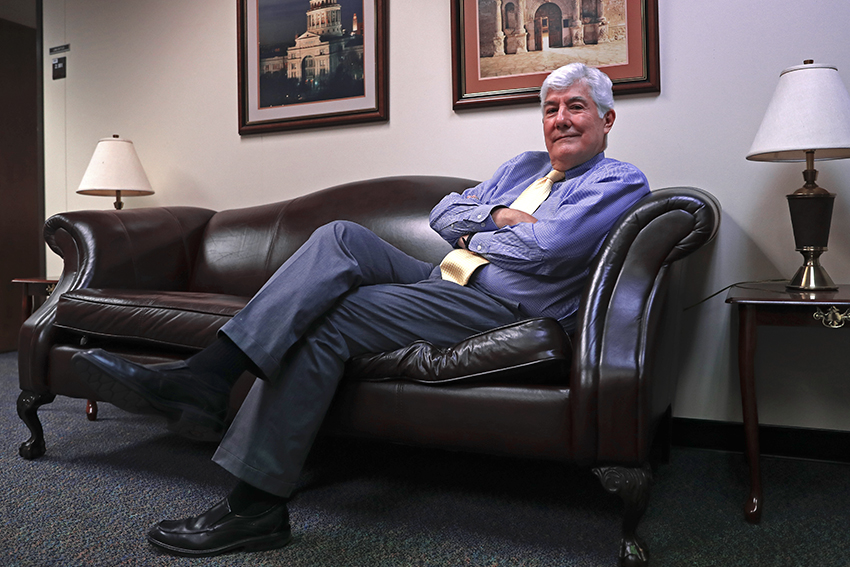Higher education commissioner Raymund Paredes said he never lost sight of the students he was working to support in his 15 years on the job, even when it meant testifying to lawmakers at the Capitol until 1 a.m.
Paredes is resigning — not retiring, which he made clear — from the Texas Higher Education Coordinating Board in August to allow someone new to take over. His 15-year tenure has seen eight different Texas Legislatures, two governors and three House Speakers. Before coming to Texas, Paredes spent 30 years at UCLA, with 10 as vice chancellor for academic development.
State Sen. Judith Zaffirini, D-Laredo, said the length of Paredes’ tenure is a testament to his “fierce commitment” to education in the state.
“Count him among those of us who believe that issues ranging from accessibility, accountability, affordability and availability must be addressed in relation to standards of excellence, which cannot — must not — be sacrificed,” Zaffirini said in an emailed statement. “His priority always was to prepare our students for a
better future.”
One of Paredes’ biggest challenges was getting the state to invest in higher education, which began to see a decline in support from the Legislature in the 1980s. He said funding never truly declined, but instead failed to keep pace with increasing enrollment, which has grown 17 percent since Paredes started in 2004, according to data from the coordinating board.
“I don’t think a lot of members of the Legislature understand the cost of delivering higher education has increased enormously,” Paredes said.
Paredes said he is unsure of what he plans to do next, but will remain active in the field of higher education policy. Before he leaves, however, Paredes will advocate to the 86th Legislature for a boost in base funding as well as outcomes-based funding, which rewards post-secondary institutions as they improve their graduation rates. But he doubts it will fully meet the needs of institutions around the state. Paredes says he also wants lawmakers to expand funding for the TEXAS Grant
program for students with financial need.
“I don’t think we’re at the point yet where the level of state funding has eroded the quality,” Paredes said. “But we need to take the attitude that we’re going to ask for more money, and we’re going to get better results. We’re not going to get more money for business as usual.”
Much of the economic gains the state would receive from higher education are long-term, not short-term, making it more difficult to convince lawmakers of its value, Paredes said. He also feels elected officials don’t understand how much post-secondary schools have done to keep costs down in spite of the rising cost of education.
While funding problems are a conspicuous issue in higher education, Paredes said he struggled with another issue that was more unseen.
“Despite what people think of universities being hotbeds of liberal radicalism … they are very conservative institutions,” Paredes said. “It can be hard to promote change.”
The main area where Paredes tried to encourage change was competency education, such as letting students test out of or finish courses early if they could demonstrate proficiency with the material. But colleges and universities often held on to the traditional semester-long class approach, he said.
Nevertheless, Paredes said he was able to make significant improvements during his tenure, which was three times longer than most commissioners. Developmental education, or ensuring students are prepared for college-level coursework, grew to accommodate more of the 42 percent of post-secondary students who the board said do not meet college-readiness standards.
Paredes also said he focused on improving graduation rates to limit the financial drain on both students and the state when they do not finish their degree.
“The hardest part is to achieve balance between access and success,” Paredes said. “Neither one is sufficient alone.”
Education policy professor Norma Cantú, a former colleague of Paredes, said Paredes maintained a solid relationship with the Legislature and Governor’s Office even when he was at odds with them. In 2015, he was one the leading higher education officials to testify against the bill to allow the concealed-carry of firearms on campus.
“He showed a level of caring and compassion for students and lived up to his personal ideals of standing up for students,” Cantú said. “He did a remarkable job of walking that line of providing support for the students and, at the same time, not losing the ear (of the Legislature).”





















